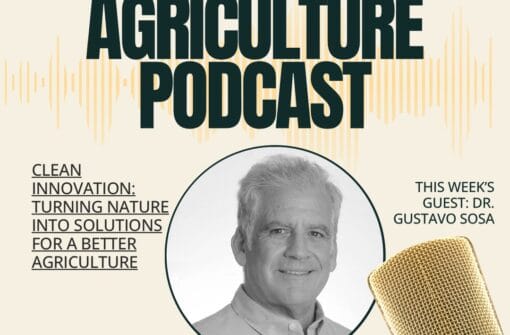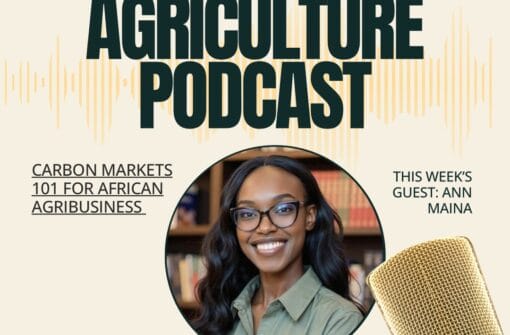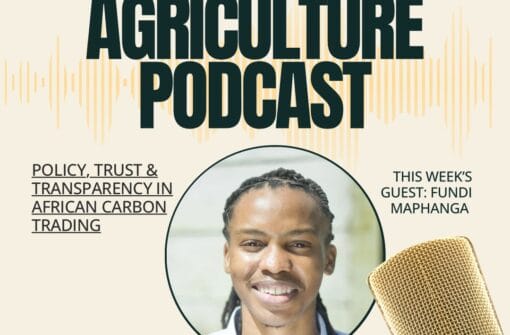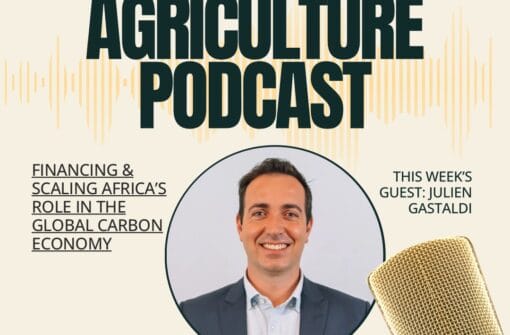Episode Description
Agriculture is often at the heart of climate conversations, but not always at the center of climate solutions. Farmers, especially smallholders, carry the heaviest weight of climate shocks while decisions are made far away from their fields.
In this episode of the Let’s Talk Agriculture Podcast, Sharon sits down with Michael Jones, Co-Founder and Lead Architect at AgroReGenerations, to explore what it really means to put farmers first in the fight for climate justice.
Michael shares his journey from city life to co-founding a global initiative spanning East Africa and Indonesia, and why inclusion, equity, and transparency must be at the core of climate action. Together, we unpack:
- Why “farmers first” is more than a slogan and what it looks like in practice
- The tension between climate justice and carbon offsets
- How AgroReGenerations is redefining offsets and avoiding greenwashing
- The role of multiple SDGs in creating a holistic path to resilience
- A vision for an inclusive, climate-smart agricultural future
If you care about equity, climate justice, and building resilience for the farmers who sustain us all, this episode is a must-listen.
About LTA Studio
This podcast is proudly produced by LTA Studio, the media and production arm of Let’s Talk Agriculture LLC. At LTA Studio, we help organizations:
🔸Produce & edit podcasts that tell compelling stories
🔸Create engaging video content that connects with your audience
🔸Design high-quality publications & media assets to elevate your brand
If you’d like to collaborate with us on podcast production or media support, reach out via studio@letstalkagriculture.com.
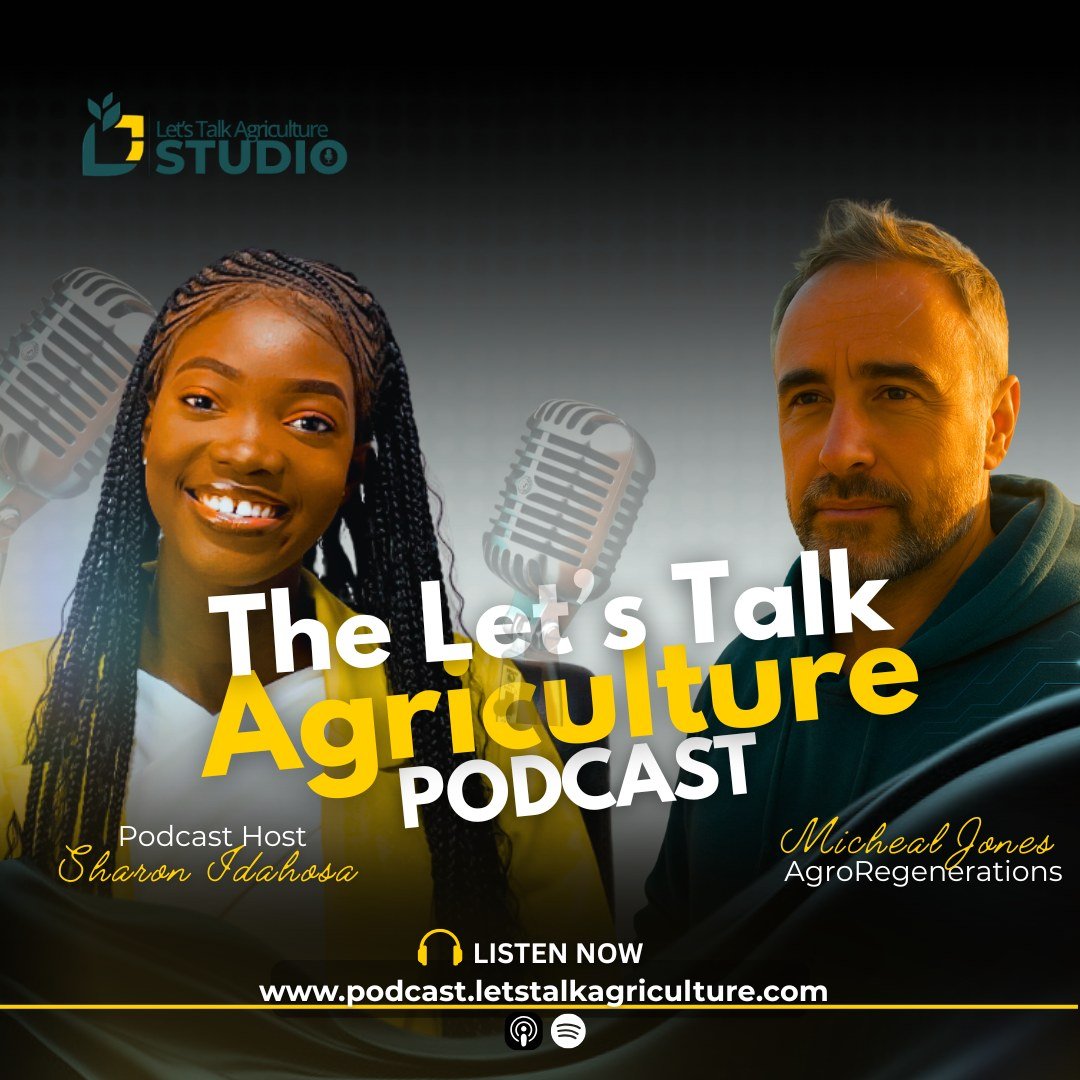
Transcript
Intro: [00:00:00] Beautiful people. Indeed. That is one of my biggest pleasure is always when I went to my own farm. So I think it’s important to first understand what a healthy relationship with food is for us to know what it’s not. Not trying to, I can relate. I can relate selfish. So you could be your own farmer for. Who knows. Trust. Trust me when I tell you, there will always be challenges, there will always be risks. Seems like we have a lot in common. Welcome to the Lets Talk Agriculture podcast show, and of course it’s your favorite girl show here.
Sharon Idahosa: Agriculture is often at the heart of climate conversations, you know, but not always at the center of climate solutions, you see farmers, especially the small holders, they carry the weight of climate shocks. While policies, carbon markets and the big pledges are made far away from their fields. So in today’s episode, [00:01:00] we are exploring what it really means to put farmers first in the fight for climate justice.
And to do that, we are joined by Michael Jones, the co-founder and the lead active at Agro Regenerations. So they’re working across East Africa, Kenya, and Indonesia. So Michael work challenges the way we think about equity, inclusion, and even the so-called solutions that sometimes leave farmers behind.
Michael, welcome to the podcast. I mean, it’s great to have you. We have, we’ve had so much back and forth.
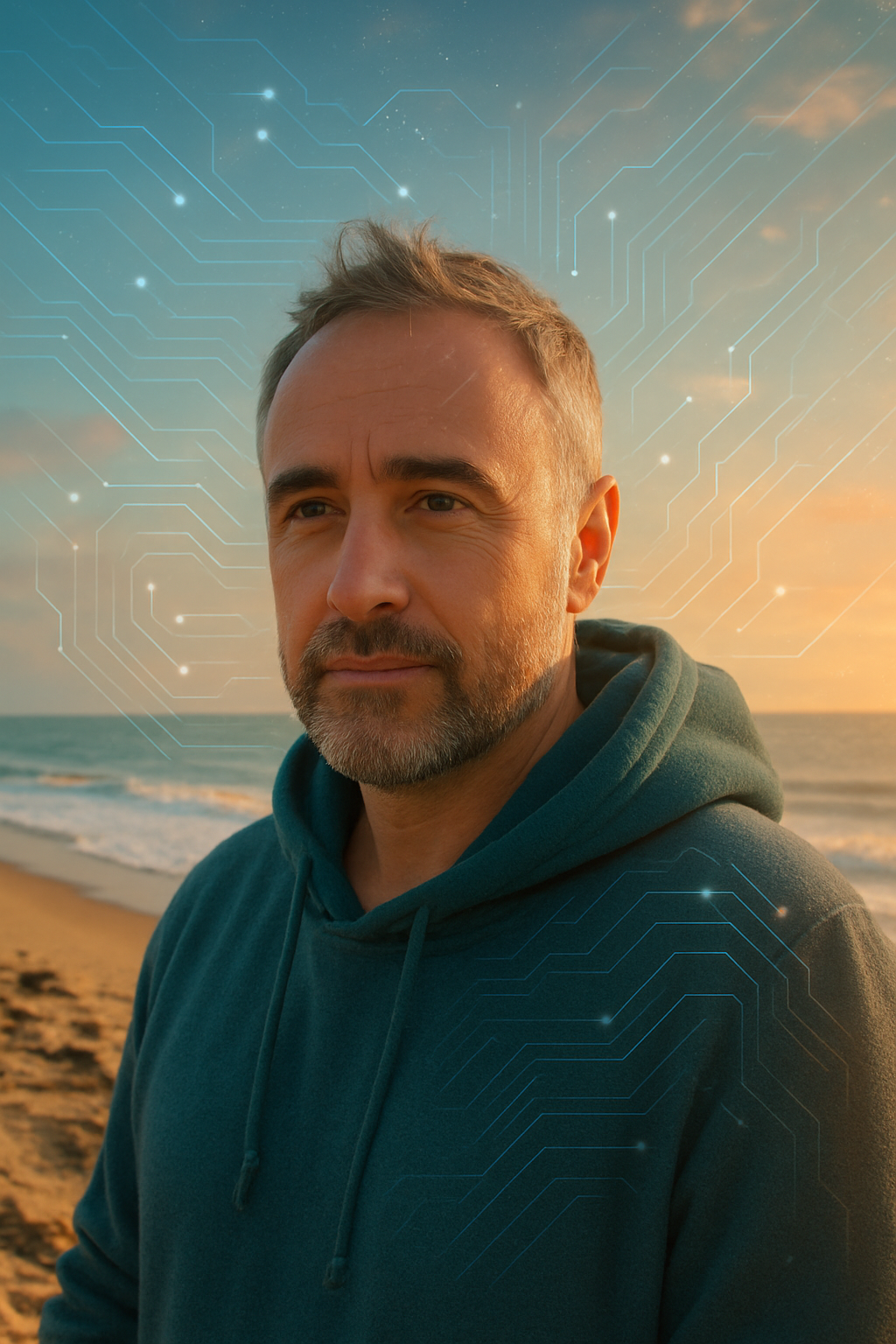
Michael Jones: No, it’s great to finally get together. I really appreciate it and I’m a big fan, so thanks so much for having me, and these are definitely very key and important subjects that are too often overlooked.
Sharon Idahosa: Great. I’m glad you are here to have this, um, conversation now. So, you know, let’s, let’s start with your journey, really, right? So,
Michael Jones: yeah, sure. Absolutely. So we’re, we’re a [00:02:00] global initiative, right? We’re focused on regenerative systems, uh, initiatives using open source tools specific exactly for small farmers and land stewards.
We’re trying to measure carbon sink value, nutrition value through regenerative practices, and kind of a full systems audit, while also redefining and creating a new standard for offsets, I don’t even wanna say carbon offsets, but for offsets that are always gonna be the communities and the farmer, and these land stewards and the ancestral landowners.
First, whether it be the individual or their community or their region or their nation should be the benef, uh, benefactor. And, you know, they’re not, it’s not about greenwashing at all, and it’s definitely not a license to pollute, um, and what we’re talking about is the people who are most at risk uh, to climate change.
So really we need to get into climate resilience. We need to understand that food security, uh, relies so heavenly outside of a few nations, so heavily on small farmers and individual farm [00:03:00] holders, not just for their households and their communities, but really globally, and they’re so often left behind.
Um, so that’s our focus, uh, is the small farm holders and we’re just doing everything we can to try to amplify their voice and put them first in everything that we’re trying to do.
Sharon Idahosa: Alright, thank you for sharing that. But I think I didn’t really get so what I was really, uh, expecting, right so I just wanted to know.
Michael Jones: No go Ahead.
Sharon Idahosa: What really made you to get right into this part of work that you do?
Michael Jones: I know why people found.
Sharon Idahosa: Yeah.
Michael Jones: Yeah. I mean, I, I grew up in cities, right? But as a kid, I was always actually very strangely drawn and passionate about horticulture and got come on my hands dirty as best as I could. Uh, but I didn’t say I wouldn’t, I didn’t grow up on farms or anything like that.
And then through my journey, uh, you know, I think it started to really, uh cement itself after spending significant amount of years in [00:04:00] China and, and living through that kind of air pollution. And we just kind of naturally created some of these natural based solutions and we created like air purifying systems using vegetation and we did upcycled garden spaces and you know, we did everything we could through education, um, to kind of tackle the air pollution, what we were living with.
And I got more involved I think with different ways of creating action and carbon accounting and when that was still kind of a new field we’re talking about 10 and 15 years ago. And then I think when carbon accounting got a little bit better as far as understanding your own carbon footprint, I think that realization that a lot of the world has hit now too, that how much of our diet and the choices we make, not just as consumers, but as in our diet consumption, how much that is our carbon footprint and just how much power that has and.
Kind of how everything comes back to, uh, the table and, and where that food comes from and just, [00:05:00] I think after being in these big cities and especially China of just wanting to get back to the source a little bit. And then just prior to the, the Panton, I spent some time in Indonesia with my wife and we were working with farmers and community outreach with the universities and the parks departments, and we are doing these workshops and working
with farmers, and I think I started to understand things a little bit better, but also understand what the pain points were and why a lot of this kind of innovation and these farmer initiatives didn’t work and how we can do it differently. And then just through the course of different projects that I was doing with Web3 for good and refi cohorts and things of that nature, and meeting and working with other people, it just became very clear that there was a real
solution that needed to be presented and I just, all of a sudden, a lot of the, the locks and the cylinders kind of lined up and it just made sense that we might be able to offer a better solution through the 20, 25 years I’ve been abroad and the ecosystem and [00:06:00] network that I’d already created and my Web3 background and my Web3 for good and my Red Cross background and all that stuff.
I was like, you know what? I’m already doing all these initiatives with NGOs. We’re already doing stuff for carbon literacy and education. Let’s do it, you know, hands on more with the farmers. And we kind of came up with this idea of agri regenerations and the specific goals and how we wanted to do it.
And we kind of got started mapping, uh, early last year I took a parental leave and then since this spring we’ve been the same team. It’s me and, uh, three other co-founders, a brother and sister from Kenya, and then a, a woman and, and. FinTech from Bangladesh has also, uh, spends a lot of time in the uk. And as a founder herself, uh, we, we just joined forces and just went forward.
And even when I was away on parental leave, they just kept quietly mapping and growing. And then since this spring we’ve just taken off, we’ve really hit the ground running and it’s just been scale and grow and scale and grow and it’s been [00:07:00] amazing, but it’s always with the farmer first and working with them as we’re learning and growing.
Sharon Idahosa: Thank you so much for sharing your journey. I think that’s really an amazing one. And then seeing that you have amazing women, you know, as part of your team, you know, when, when women are involved. Yeah, it’s, it’s just like you said, I mean, you went on parent to leave and then they are left with handling things and of course things are still working well.
So I’m really glad that, um, this, um, collaboration. Of course with a different country, different, um, culture as well can still help to, you know, grow what you are building, right?
Michael Jones: Oh, absolutely. I Mean, mm-hmm. To jump in, I mean, two of our co-founders are women. My wife is also a huge, you know, advisor to this and has amazing credentials and, and water research management and carbon literacy and the educational and charity side of things.
But also we just onboarded our systems. Uh. And all of our systems alignment right now, uh, [00:08:00] who’s kind of taking over all the tech side of it, is this superstar, you know, 20 something year old young woman from, uh, who’s just finishing up her master’s at the University of Birmingham Deepa, and she’s kind of now taken over all of our tech.
And it’s this great to be working with these young people, but also, uh, you know, to have women on the team that are just, I mean. It’s almost seems silly to highlight there, uh, because I, you know, would you do that with a man? It’s, it’s very, it’s a funny place to be in, but it’s, I’m so honored and thankful that I’ve got, uh, we’ve got such a well-balanced team with older and younger and women and different parts of the globe represented it and different perspectives, but we’ve got some amazing people really leading the way.
Sharon Idahosa: Well, yes, I’m glad to hear that. I really appreciate the work that you do. It’s really commendable and of course, I mean, you are having women, young [00:09:00] people on your team. I think it’s, it’s really a game changer and I look forward to seeing how, how well our regeneration is just gonna grow. I’m definitely, yeah, my eyes out now.
I mean, I.
Michael Jones: Well, you know, we were meant to start our one year pilot for the Autumn Equinox, even though a lot of our work is on the equator, right? We’re in Kenya and sprawling in East Africa, and then NTB with Lambuk and Sumbawa Indonesia. And we were trialing right now, uh, while we’re built out our dashboard and we’re ready to do a full one year pilot, uh, starting with the autumn Equinox between September 21st and September 23rd.
In just the past three weeks, we were hoping to onboard about 40 farmers to kind of try things out and in those three weeks, we’ve jumped up to, now we’re under, our purview is 3000 hectares and over 600 farmers, and we’ve done that all organically. And we’ve got two NGOs that are UDP backed, two large mangrove restoration sites that are well established.
We’re [00:10:00] sprawling into areas that are doing war recovery zones. Uh, we’ve got innovators and experts, but then we also have our farmer communities that we’re working with. And it’s just really gone crazy. Even though we’re small. Like if you look at our LinkedIn, you know, we’re at like 450 people today. It’s not a lot, but that’s three times what we were four weeks ago.
So it’s really, it’s really kind of taking shape and, and it’s now getting past kind of this proof of concept. We’re ready to scale and we’re ready to really, really run with it.
Sharon Idahosa: Amazing. I’m looking forward to it. I mean, we are now connected, so I definitely keep my eyes out for you, So, uh, you talk a lot about the farmer’s best approach, you know, so beyond that race.
What does that actually look like in practice? You know, especially with the communities that you’ve worked with.
Michael Jones: Well, so we’re talking about, uh, for example, like the carbon offset and you see these, [00:11:00] these offset initiatives and things like that. So one thing that’s very popular and a way to do that is through biochar.
So when we say farmers first, like what we’re doing right now is trialing out a small biochar kiln that could be built semi permanently, like it should last for years with modest maintenance for individual farmers that at about a price point. For most of, uh, east and West Africa of about 10 US dollars per unit to build possibly less, and we’re
prototyping, how we can share that information to have those built and that we could scale them for all the farmers that we’re working with. And then they control their own biomass. They’re burning it, they’re able to manage their own, uh, organic waste on their farms, and then they’re also getting that biochar for their fertilizer.
For their use, for their tree seedlings, for their gardens. So when we do initiatives, whether it be biochar, whether it be we’re doing like a, we’re part of a mushroom [00:12:00] consortium, whether we’re growing oyster farms or upcycled mushrooms, you know, we’re trying to control the spawns. We’re trying to make sure that that the biochar that’s being produced is all done at the individual farmer level.
We’re trying to make sure that we’re creating opportunities for young people and for women, and that that’s why we say generations because if you just have farmers showing up for a free lunch and trying to get a one-off reward, you’re not gonna really create that kind of change or benefit that community.
So we’re trying to make those resources available for those farmers and those communities and do it in a way that we can quantify those results and those results to us. Those multiple SDGs that we’re trying to track and improve upon. Those results are always starting with that farm, their immediate community, their family, and then their outlying community.
So if we’re helping one farmer, hopefully we’re able to equate that to 10 more people that had a knock on positive effect from the work that we’re doing [00:13:00] and the work that we’re doing, the outreach we’re doing. Where we’re directly working, which is Kenyan, NTB, Indonesia, we have our anchor partners and they’re there in the field working directly with these farmers.
Sharon Idahosa: Amazing. I think that’s a great, um, approach. Thank you so much for sharing that. Um, you know, one of the big tensions that we see currently is, um, climate justice and the rise of carbon offset. Yeah. So I just wanna know from your perspective, right, where do you see offset going wrong. I mean, and how, yeah.
Michael Jones: Yeah, so we’re, there’s two things there.
I mean, with carbon, with offsets, I think they need to be redefined. I think they need to be, they’re not a license to believe. If organizations want to get to net zero, they are a lot of ways to get to net zero before they start looking at offsets. I think planning trees and all the world’s arable land isn’t gonna make a huge difference if you’re not looking at a holistic approach.[00:14:00]
I think you can’t just measure positive impact by CO2 per ton reduced that. It’s more than that. Um, so you do have to really incorporate multiple SDGs and how you’re infecting these communities and creating opportunities and getting people, uh, with, uh, social mobility. Um, you know, giving them access to the resources and tools and amplifying their voices and letting them have the opportunities that everybody else
should be having. Uh, and is that part of your equation when you think of an offset, or are you just some big extractor? You know, Kenya right now is a huge market for carbon offsets and how much of that is really going back to the community. So we are trying to set a new standard and the way to do that.
I think we are mixing in with Web3 because of the fact that it’s so transparent using a ledger. So our idea is that everything is, should be fully transparent and third party validated, and we have a burn mechanism that’s codified. So, uh, it’s very clear what we’re doing and who’s the beneficiary and what, [00:15:00] uh, that offset actually means.
And, and again, it’s multiple third party validation, so. I think offsets there is a place for them. If people truly wanna achieve net zero, I think an offset is a possibility to make that happen. But I think that they need to be redefined and I think they need to be much more stringent. And I think there needs to be, I wouldn’t say regulation, but there just has to be a much higher standard and more education around them specifically.
And that. Above all, if you’re going into nations and you’re doing offsets that the communities, the people within those regions are the beneficiaries and not the ones that are being extracted from. And then when we talk about climate justice, I think there’s a real huge misunderstanding. You know, there’s, it’s very clear, like if you look at, just this weekend you have these massive floods, loss of life in Pakistan and Pakistan
itself is responsible for 1% of CO2 and, and, and the cause of, of [00:16:00] climate change, you know, uh, but yet they’re the first ones that are getting the impact. And that’s true for so much of the global south for so many regions that are building up right now. So there’s a really strange mixed opportunity if you’re in a nation that’s being built up and they’re achieving this middle class, they should absolutely have the opportunity to have that middle class.
There’s also an opportunity to do it in a sustainable way, but not a punitive way. You shouldn’t be punitive to people who wanna achieve middle class and have the opportunity and the resources and all the things that other nations had previously and abused and caused so much waste and pollution. You shouldn’t
penalize people who are now getting into that class system, whether it be Brazil or China or East Africa or West Africa, anywhere that they’re rising and they’re getting into this middle class and have these opportunities that all these other nations had previously, they shouldn’t be penalized and not be able to have them because of [00:17:00] what their CO2 would be if they became middle class, if they became higher consumers, if they became higher meat eaters
I think there’s a way to do and be a smart city builder and look at natural based solutions that you can make things better in those nations, but you should definitely give all the people who wanna be in this middle class or this higher bracket of a higher standard of living, absolutely deserve to have that higher standard of living and not be penalized because of one third of the world who wanted to take and keep all the resources.
So social justice, climate change and climate resilience, they’re absolutely contextual and aligned and and in sync. And if people don’t understand the connection between the two, they really don’t understand the problem that we’re facing today.
Sharon Idahosa: Okay. Thank you so much for sharing that. So do you think that probably we need to, you know, create awareness around this?
Michael Jones: I mean, education is always a, a good starting point and, uh, you know, there’s great organizations out there that are either helping you with understanding your carbon [00:18:00] footprint or there’s courses that you can take, you know, around, uh, sustainable development or looking at, say, the Club of Rome and Earth for All.
And they do clearly define the fact that if you’re not eradicating poverty, if you’re not creating equality and inclusion in your formula for um. Combating, uh, climate change, then you’re not really looking at the problem completely. So, uh, education is always, uh, a key to help unravel and unpack all of this.
For many, you know, when we look at the, the issues that we’re facing, sometimes it’s just all too overwhelming and there’s just too many pieces to it. So absolutely, education and resources are a good part of that, but you also have to give people, I think, a track to make action that’s more significant.
Then say, planting a tree or reusing a bottle or bringing a cloth back to the sea market, and all those things are good, but they shouldn’t be considered like a pass that they did their part. We all have to dig in a little bit deeper, I think, if we’re really gonna face the root [00:19:00] problem so that we’re all facing as a global society today and this into the next generation.
Sharon Idahosa: Okay. Thank you for sharing that. So I’m just a little bit conf, um, should I say confused? You know, so this is not exactly my field, but I just wanted to get something issue because, you know, we see a, a whole lot of, um, planting of trees, um, saying that this is going to help us with the climate change. So you’re saying that
um, this doesn’t exactly solve the problem, and there is more to do. Is that,
Michael Jones: um, yeah, I’m saying listen, I, and again, there’s, there’s a saying, right? So when I worked with Jane Goodall, uh, roots and Shoots, and she does her speech and she says, you know, it’s better to light a candle than to curse the dark. So it’s better to light a candle than to curse the dark.
And planting a tree is a small step in the right direction. Okay? But I think. That if you think that you’ve planted a tree and that you’ve did your part for combating climate change and you were absolved from doing anything [00:20:00] else or learning anything else more or participating in anything else, and you could just be a consumer and do what you want.
I think that there is a bit of ignorance there and there is a bit of kind of being, uh, turning a blind eye when you really can’t anymore. Um, the reality is, is the data says that if we planted trees in all the arable land that existed, it still wouldn’t be significant enough to combat the climate change and the CO2 increase that we’re looking at globally.
That’s a hard truth. However, if we target, like for example, when we talk about planting trees, what I’d like to see today, I’d like to see urban settings going crazy, planting trees. You wanna talk about heat and problems in cityscapes. If everybody planted trees within an urban setting and looked at more natural based solutions in the cities.
Then we have something to look at. But uh, as far as just filling up arable land with trees, uh, especially if you’re doing it in a monocropping way and you’re not specifically rewilding, no, that’s not enough. [00:21:00] If you have a small community and part of that community is just at risk of flood or, or is being misused planting trees there
is absolutely a great initiative, but that alone isn’t enough. Like if you have a protected space and you’re doing agroecology, that’s good, but you can’t just have one type of tree. I. Forest a whole region that way. Uh, so it, you know, it’s, it’s, it’s a layer. Uh, but yes, I, I would say that I have to stick by the fact that yes, if you think you’re just planting a tree and you’ve done enough for the environment that you’re okay, no, it’s, it’s really not enough.
No.
Sharon Idahosa: Okay. Thank you so much for sharing that. I’ll definitely keep that in mind myself. Right. So. So you’ve said, um, multiple SDGs and a holistic approach are the only real part to climate resilience, right? So can you share how agro regeneration is within these connections together on the ground?
Michael Jones: Well, we’re [00:22:00] trying to eradicate poverty.
Poverty by creating opportunities for our farmers, get them on a higher value chain with their crops, getting them more opportunities to resources that maybe they didn’t know that they had, whether it be local NGOs or government grants or loans. Um. Education, financial education, uh, resources within reason.
We don’t wanna just be gifting or rewarding. I mean, there is a reward element, but it’s not just about rewards, it’s about, uh, resilience. So eradicating poverty. Yeah, equality. Making sure there’s opportunities for youth. Uh, so they have opportunities, especially in certain regions of where they were, were working, where it’s such a high youth population and there just aren’t enough opportunities.
For them, uh, for employment, for growth, for social mobility. So is there youth initiatives? Yes. Is there equality for men and women? Yes. We’re trying to encompass that. Is there a focus on eradicating poverty? Yes. Absolutely. Are we focused on the land and ecology and soil health? Yes. So [00:23:00] already right there, that’s like four STGs that we’re talking about.
Obviously we’re focused on food security, um, and we’re focused on. Um, making sure we’re not trying to be land acquisition. We, we wanna make sure that the ancestral owners of land are the very least the stewards of that same land. Um, and we’d like to see them potentially have that land, but we’re not gonna go there.
We wanna make sure that we’re supporting the small land owners and the land stewards who are working within these lands, and if we can find opportunities to get ancestral landowners back to working those lands, then yes. So those right there is just four or five SDGs in itself. So that’s how we’re doing it, is by the ground, by working with these farmers, but at a community level, um, and not just saying, um, here’s a seed, here’s a tree, you know, we’ll get back to you.
Or here’s a one-off reward. Good luck. You know? Um, so that’s what I say when, uh, we’re, we’re encompassing multiple s teachers.
Sharon Idahosa: All right? So if we move fast [00:24:00] forward to, let’s say, um, 10 years. What does, what does an inclusive climate resilient agriculture system looks like to you? I mean, what does it look like to you?
What’s one Well,
Michael Jones: okay, go ahead. Permaculture, permaculture, no pesticides. Food security. Uh, more biochar, more roads, more infrastructure, smart cities to move more alignment with natural systems as opposed to just trying to conquer systems. Like a simpler approach, but using it in a way, using that ancestral knowledge through with technology for advancement.
So we’re not just trying to replace natural systems with technology, but integrate them. That’s where I see, you know, and the ones that are most resilient. I don’t wanna see these big swaths of populations in the planet just unusable or unlivable. So, uh, fighting back desertification and just making sure that the communities are thriving everywhere.
Sharon Idahosa: Okay, so what’s, what’s that one step that our listeners [00:25:00] can take today, you know, to help us move closer to that future?
Michael Jones: Well, you know, a little bit of education, understanding where their food comes from, their farmer, you know, like looking at mm-hmm. Just more simpler techniques. Alternatives to pesticides for one, understanding that monocropping isn’t the way, you know, if you’re monetizing your farm or you’re involved in offsets, you know, uh, where is there efficacy there?
Is it just a payday? You know, basically, I’d say s the hard. Questions and understand where your role in all this is and that we all, when we talk about food security, we all are connected, you know? Um, where are you sourcing what you’re getting? Do you wanna know? Uh, you know, so I would say, you know, especially when it comes to your foods and the choices that you make as a consumer, I would say ask yourself the hard questions.
And then two, I would say, you know, reduce, it’s not about recycling, uh, as much as it is reducing.
Sharon Idahosa: All right. Thank you so. So much. You know what I love about today’s [00:26:00] conversation is, is just how it reminds us that climate solutions aren’t just about the policies or the carbon markets, right? They’re basically about people.
Correct.
Michael Jones: Absolutely. So
Sharon Idahosa: yeah, farmers, you know, especially the smallholder farmers, us, they are major parts. They’re not just the stakeholders, they are, I, I, I consider them as the heartbeat of agriculture.
Michael Jones: Absolutely.
Sharon Idahosa: Climate resilience. Right. So, and of course your work at Regenerations, um, really just shows what’s possible when inclusion is just, should I say more than.
Buzzword now. Right? So, you know when systems are designed with the farmers at the center, right? And we hold ourselves accountable, um, against greenwashing, I think it’s really just going to help us go a long way. So if there is one takeaway from today, it’s [00:27:00] this building. Climate resilience requires a holistic lens connecting the dots across food.
Equity and justice, and most importantly, it requires listening to the very people that are growing our food. Thank you so much.
Michael Jones: No, thank you. I think I got cut off there for a second. I’m gonna go and I so appreciate it and I wish you the best and, you know, let’s, hopefully we could circle back in a few months and, uh, you know, to all your listeners, it’s great stuff.
I really appreciate this podcast and the work that you’re doing and, uh, let’s all just keep, keep doing what we can and, and remember it’s gonna, you know, it’s a community. We’re all gonna have to work together to get there.
Sharon Idahosa: Thank you so much, and to our listeners, we hope you’re leaving this episode with a fresh perspective and something to reflect on in your work.
Until next time, thank you. Take care. I remain you humble. Bye. Thank you so much [00:28:00] all.

